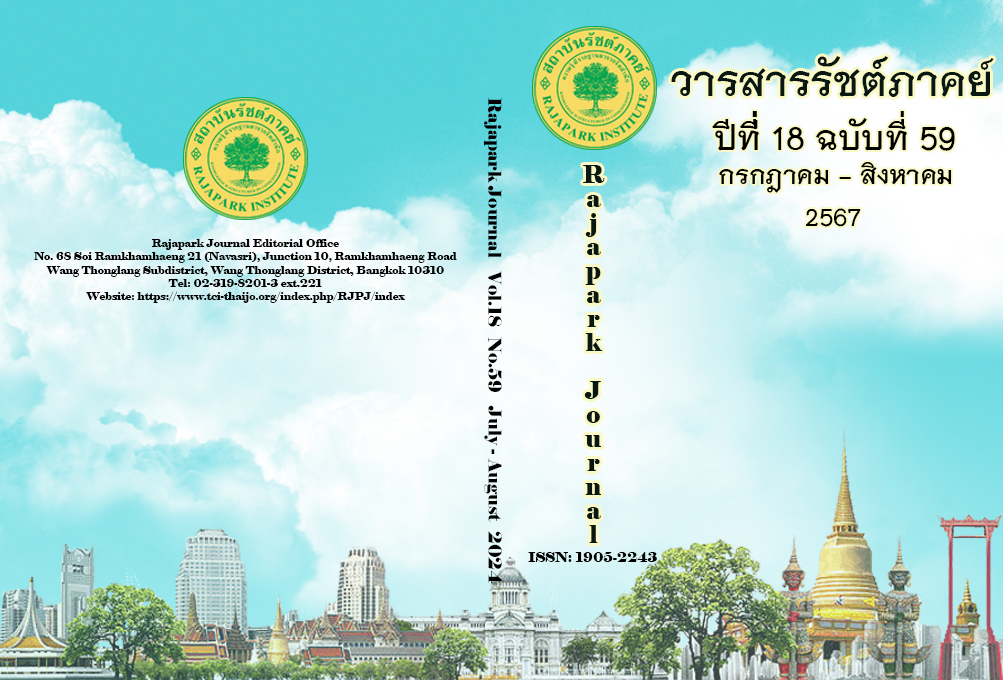การจัดการความรู้ที่ส่งผลต่อประสิทธิภาพการทำงานฝ่ายทรัพยากรมนุษย์ในองค์การระหว่างประเทศ
Main Article Content
บทคัดย่อ
การวิจัยครั้งนี้มีวัตถุประสงค์เพื่อ 1) ศึกษาระดับการจัดการความรู้ของฝ่ายทรัพยากรมนุษย์ในองค์การระหว่างประเทศ 2) ศึกษาระดับประสิทธิภาพการทำงานของฝ่ายทรัพยากรมนุษย์ในองค์การระหว่างประเทศ และ 3) ศึกษาความสัมพันธ์ระหว่างการจัดการความรู้และประสิทธิภาพการทำงานของฝ่ายทรัพยากรมนุษย์ในองค์การระหว่างประเทศ การวิจัยครั้งนี้เป็นการวิจัยเชิงปริมาณ กลุ่มตัวอย่างที่ใช้ในการวิจัยครั้งนี้ ได้แก่ บุคลากรฝ่ายทรัพยากรมนุษย์ในองค์การระหว่างประเทศ คำนวณหาขนาดของกลุ่มตัวอย่างโดยใช้สูตรของทาโร ยามาเน ได้กลุ่มตัวอย่าง จำนวน 65 คน ใช้การสุ่มตัวอย่างในรูปแบบความน่าจะเป็น ด้วยวิธีการสุ่มตัวอย่างแบบง่าย เครื่องมือที่ใช้ในการวิจัยได้แก่ แบบสอบถาม ที่ได้รับการตรวจสอบหาค่าความเชื่อมั่น ได้ผลลัพธ์ค่าความเชื่อมั่นที่ 0.941 สถิติที่ใช้ในการวิเคราะห์ข้อมูลประกอบด้วย สถิติเชิงพรรณนา ได้แก่ การแจกแจงความถี่ การหาค่าร้อยละ การหาค่าเฉลี่ย การหาค่าส่วนเบี่ยงเบนมาตรฐาน และสถิติอ้างอิง คือ การหาค่าสัมประสิทธิ์สหสัมพันธ์แบบเพียร์สัน ผลการวิจัยพบว่า 1) การจัดการความรู้ ภาพรวมอยู่ในระดับมาก ในรายด้าน พบว่า อยู่ในระดับมากที่สุด 1 ด้าน คือ ด้านการแบ่งปันความรู้ และระดับมาก 2 ด้าน คือ ด้านการนำความรู้ไปใช้ และด้านการสร้างความรู้ ตามลำดับ 2) ประสิทธิภาพการทำงาน ภาพรวมอยู่ในระดับมาก ในรายด้าน พบว่า อยู่ในระดับมากทุกด้าน ได้แก่ ด้านคุณภาพของงาน ด้านเวลา ด้านค่าใช้จ่าย และด้านปริมาณงาน ตามลำดับ และ 3) ความสัมพันธ์ระหว่างการจัดการความรู้และประสิทธิภาพการทำงาน ภาพรวมมีความสัมพันธ์ทางบวกอยู่ในระดับสูง ในรายด้าน พบว่า มีความสัมพันธ์อยู่ในระดับสูง 2 ด้าน ได้แก่ การจัดการความรู้ด้านการนำความรู้ไปใช้มีความสัมพันธ์ทางบวกกับประสิทธิภาพการทำงาน และ การจัดการความรู้ด้านการแบ่งปันความรู้มีความสัมพันธ์ทางบวกกับประสิทธิภาพการทำงาน ตามลำดับ และระดับปานกลาง 1 ด้าน คือ การจัดการความรู้ด้านการสร้างความรู้มีความสัมพันธ์ทางบวกกับประสิทธิภาพการทำงาน
Article Details

อนุญาตภายใต้เงื่อนไข Creative Commons Attribution-NonCommercial-NoDerivatives 4.0 International License.
ทัศนะและความคิดเห็นที่ปรากฏในวารสาร ถือเป็นความรับผิดชอบของผู้เขียนบทความนั้น และไม่ถือเป็นทัศนะและความรับผิดชอบของกองบรรณาธิการ
เอกสารอ้างอิง
Bloom, B.S. (1956). Taxonomy of educational objectives, handbook I: The Cognitive Domain. David McKay.
Brown, J., & Duguid, P. (1998). Organizing knowledge. California Management Review, 40(3), 90-111. https://doi.org/10.2307/41165945
Fahey, L., & Prusak, L. (1998). The eleven deadliest sins of knowledge management. California Management Review, 40, 265-276. http://dx.doi.org/10.2307/41165954
Garfield, S. (2014, Aug 11). 15 Knowledge management benefits. Linkedin. https://www.linkedin.com/pulse/20140811204044-2500783-15-knowledge-management-benefits/
HR Portal of the United Nations. (2015). Learning priorities: Knowledge management. https://hr.un.org/page/learning-priorities-knowledge-management
Jongjaipak, P. (2015). Knowledge management of the office of permanent secretary, Ministry of Commerce[Master’s thesis, Sukhothai Thammathirat Open University].
Khongsat, S., & Thamwong, T. (2015, Nov 25). Index of item objective congruence (IOC). Mahachulalongkornrajavidyalaya University. https://www.mcu.ac.th/article/detail/14329
Maichan, A. (2017). The factors affecting performance efficiency among employees in machine installed production LINE, Songkhla province[Master’s thesis, Prince of Songkla University]. http://kb.psu.ac.th/psukb/handle/2016/11704
Millet, J. D. (1954). Management in the Public Service. The quest for effective performance. McGraw-Hill.
Nonaka, I., & Takeuchi, H. (1995). The knowledge-creating company: How Japanese companies create the dynamics of innovation. Oxford University Press.
O’Dell, C., & Grayson, J. C. (1998). If only we know what we know: The transfer of internal knowledge and best practise. The Free Press.
Office of the Public Sector Development Commission and Thailand Productivity Institute. (2005). Manual for knowledge management plan. https://www.afaps.ac.th/kmcorner/km58/km_web/KMplanmanual.pdf
Peterson, E., & Plowman, G. E. (1953). Business organization and management (3rd ed.). Irwin.
Phanthong, J. (2019). Reliability for research questionnaire. https://www.shorturl.asia/QPzgB
Pinkesorn, K. (2021). Knowledge sharing. School of Management Science, Sukhothai Thammathirat Open University. https://mgtsci.stou.ac.th/knowledge-sharing/
Policy and Quality Development, Faculty of Science of Mahidol University. (n.d.). Knowledge Management: KM. https://quality.sc.mahidol.ac.th/plan_and_policy/km/
Rehman, M., Mahmood, A.K., Salleh, R., & Amin, A. (2014). Job satisfaction and knowledge sharing among computer and information science faculty Members: A case of Malaysian Universities. Journal of Applied Sciences, Engineering and Technology, 7(4), 839-848. DOI:10.19026/rjaset.7.326
Saha, S., Thongkham, S., & Thampramual, P. (2021). Knowledge management affecting supporting staff work performance in Thepsatri Rajabhat University. Rajabhat Rambhai Barni Research Journal, 15(3), 155-164. https://so05.tci-thaijo.org/index.php/RRBR/article/view/256480
Sallis, E. and Jones G. (2002). Knowledge management in education; Enhancing learning and education. Routledge.
Thongrang, S., & Jungsuwadee, K. (2014). The factors influencing the performance efficiency of the supportive personnel of Ubon Ratchathani Rajabhat University. Ubon Ratchathani Rajabhat University. RMUIT Journal Humanities and Social Sciences, 2(1), 67-83. https://so05.tci-haijo.org/index.php/RMUTI_SS/article/view/195928
United Nations. (2016). Knowledge Management in The United Nations System. Joint Inspection Unit.
Vartiainen, M., & Vanharanta, O. (2023). Hybrid work: Definition, origins, debates and outlook. European Foundation for the Improvement of Living and Working Conditions. DOI:10.13140/RG.2.2.12847.71844
Yamane, T. (1973). Statistics: An introductory analysis (3rd ed.). Harper & Row.


